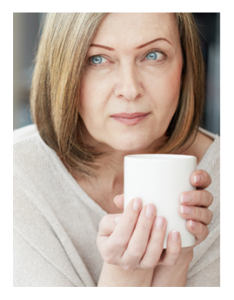The experience of pain – emotional or physical – is highly individual. Not only have I seen this as a parent in observing differences between my sons, but I know it to be true among my peer group, and to have evolved over time in my own life.
 I’ve noticed that as I’ve gotten older, my pain threshold is higher. However, don’t most of us who have given birth without benefit of anesthesia have a different appreciation for pain afterward?
I’ve noticed that as I’ve gotten older, my pain threshold is higher. However, don’t most of us who have given birth without benefit of anesthesia have a different appreciation for pain afterward?
Beyond physical discomfort, we often look at resiliency – the capacity to pick ourselves up and keep going – as a matter of our psychological makeup, the event(s) that impact us negatively in the first place, and a range of other factors.
Do We Get More Resilient With Age and Experience?
We generally like to believe we’re resilient, or that we can grow more resilient over time. We like to think the same of our children, if presented with especially tough challenges, though I sometimes think this is a convenient assumption on the part of adults.
Still, when we survive hard times (in other words, emotional pain), and if we’ve developed the tools to deal with it, are we in fact better equipped to manage physical pain as well, not to mention an ever-increasing load of drama or hardship?
Or, as I heard the whole time I was growing up in reference to losses of all types – “it builds character.”
I suppose you could say that’s a euphemistic version of “what doesn’t kill you makes you stronger.”
Moving Through… and Living With…
In the aftermath of hard times, however you may define them, some of us do better than others when it comes to plowing ahead, accomplishing our goals, loving our children, and getting through “to the other side.” Not unscathed, mind you, but nonetheless feeling as though our equilibrium has been restored sufficiently to be functional and even-keeled.
(Personally, I believe “moving through” and “living with” or more apt terms for many of us, especially in that tricky context of “moving on after divorce.”)
And having observed that various bouts of physical pain, especially chronic physical pain, have moved my pain threshold, I think of emotional pain in a similar fashion. We toughen up, we become survivors, we keep going because we know we can. The experience of “getting through” teaches us that we can do it again if we must.
But back to those differences – and not only in individuals, but in circumstances. Nagging toothache may be more unbearable to my neighbor than it is to me, and back pain may be more unbearable to me than it is to him.
Factors in Managing Pain
I’m thinking out loud here… as I consider my life and those close to me. I would think that age is a factor in managing pain, and I would think experience with pain is itself a factor. For that matter, when I’m sleep deprived or moody, I’m more sensitive to any pain of any sort than if I’m happy, focused on my kids (for example), or otherwise preoccupied. And surely attitude kicks in somewhere along the line – whether making friends with the pain in a way, or telling it “I’m kicking you in the butt and not letting you get me down.”
But marital status? Psychic pain, physical pain, and marital status? Do we really think there are potential associations of note?
Time Healthland presents an intriguing bit of research in “Widows Feel Less Pain,” citing a study of 2,000 patients that suggests that
… widows do better with chronic pain.
In fact, the data that explicitly looks at chronic pain and marital status yielded unexpected results.
… researchers expected to find that married people, because of the support of and connection to their spouses, would do better at dealing psychologically with chronic pain… Yet it was only widows and widowers who suffered less depression, anxiety, frustration, fear and anger in response to their pain. Neither married, single, divorced or separated patients did better as a group.
Coping With Loss, Pain, and Resilience
The article goes on to suggest that loss seems to eventually encourage coping strategies that foster increased resilience. In case you’re wondering, factors like age, gender, ethnic group or even the intensity of pain result in the same findings. (That said, I would be interested to know if the women in the study were caring for children, amount of sleep, amount of financial stress.)
I find I’m mulling this, with a great deal of interest.
I think about my situation in all the years following divorce, with injuries sustained here and there, two surgeries, but responsibility for two children. I didn’t have time to dwell on pain, so I didn’t – as simplistic as that sounds. Of course there’s pain and there’s debilitating pain and, as in the study, I’m talking about chronic pain of various sorts, but not the kind that doubles you over and renders you non-functional.
What Doesn’t Kill Us Makes Us Strong? Maybe
While comparisons of loss and grieving between death of a spouse and divorce are apples to oranges, aren’t circumstances to be taken into account? What about the “coming out the other side” of grieving, to which the writer refers in this article? What about those who grieve the loss of a part of themselves, for example if they become disabled? And the importance of one’s support network – family, friends, community?
 Also intriguing in the article and its conclusions – the acknowledgment that personality type plays a significant role, referring to the “psychopathology of those dominated by negative thoughts.” The article points out that this isn’t the same as complaining. Does that mean my defiant approach of “I’ll kick your butt” directed at pain may in fact be a positive response to the aggravation of its constant irritation?
Also intriguing in the article and its conclusions – the acknowledgment that personality type plays a significant role, referring to the “psychopathology of those dominated by negative thoughts.” The article points out that this isn’t the same as complaining. Does that mean my defiant approach of “I’ll kick your butt” directed at pain may in fact be a positive response to the aggravation of its constant irritation?
Clearly, no one wishes the loss of a loved one on any person, or the need to power through it – especially raising children. The article takes up the issue of the aging of the American population (and as such, the inevitability of loss), and in some way seeks to be encouraging. I’m not sure I take solace in what the writer is trying to point out, but any examples of the human spirit’s capacity to rebuild after devastation serve as important reminders, whatever the circumstances.
Leave a Reply